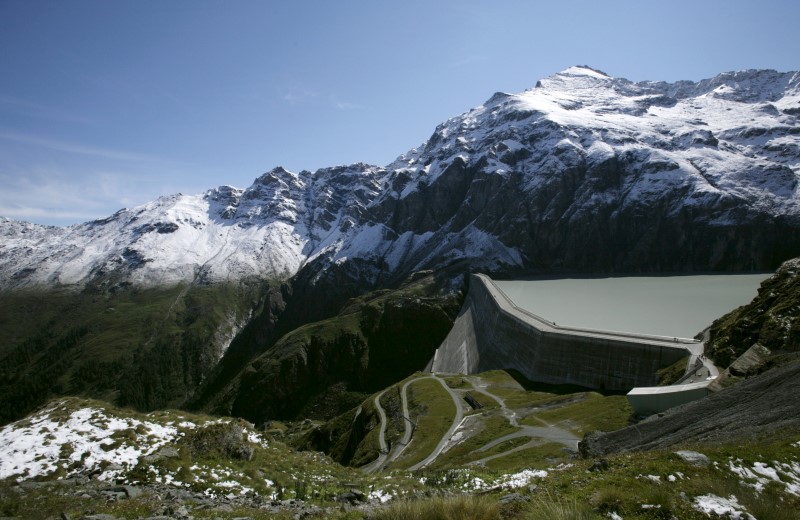By John Miller
ZURICH (Reuters) - Juergen Silberzahn, mayor of the southern German village of Wolpertshausen, marched against nuclear power in the 1970s and has warmly embraced Germany's bid to provide four-fifths of its energy from renewable sources by 2050.
Silberzahn's own efforts to promote green energy during 26 years in power are evident -- rooftop solar panels, wind turbines, a biogas-powered heating network and an electric car charging station. Wolpertshausen produces 22 percent more power than its 2,000 residents consume.
"Innumerable small communities will produce lots more energy than they use themselves," Silberzahn said in a telephone interview.
To the south, however, Switzerland's biggest utilities -- Alpiq and local government-owned Axpo -- contend that Silberzahn's green oasis has a darker side and that they are suffering because of policies, including subsidies, that have pushed up production across Europe.
They argue that their dams high in the Swiss Alps and lowland nuclear reactors have been made unprofitable by a renewables-fueled electricity glut that has sent wholesale prices spiraling to record lows.
Axpo and Alpiq, which sell much of their power in Europe's cross-border trading system, have posted losses totaling nearly 1.9 billion Swiss francs ($1.96 billion) since 2014.
"Compared to 2009, prices have dropped over 70 percent," said Axpo Chief Executive Officer Andrew Walo, in a video on the company's website. "We are producing well above market price with many of our plants," he added.
CASTLE ON THE MARKET
In response, Axpo is selling assets and boosting trading activities, to reduce its dependence on wholesale prices.
The most eye-catching item up for auction is the 17th-century castle, Schloss Boettstein, in northern Switzerland. In the 1960s, it housed staff building Axpo's Beznau nuclear plant but which has become just another pawn in the company's bid to free up cash.
There is no sale price yet but the proximity of the nuclear plant might temper expectations.
Alpiq, whose shares have plunged 36 percent this year, is also restructuring, seeking to unload up to 49 percent of its prized hydroelectric assets that include Grand Dixence, at 285 meters the tallest gravity dam in the world.
"We can and must tackle this challenge immediately since Alpiq already has potential buyers for hydropower," said spokesman Andreas Meier.
Suffering Swiss utilities are far from unique in Europe.
Companies operating coal, gas and nuclear plants have also largely failed to figure out how make money, amid a proliferation of subsidized wind and solar, sluggish economic growth and an EU-driven energy efficiency drive.
Germany's E.ON and RWE have taken steep writedowns on assets, while Sweden's Vattenfall reported a record $2.31 billion annual net loss last month.
"What we need in the current situation is for some of the capacity in continental Europe to retire, but people aren't very quick to close capacity," said Stephen Woodhouse, a director at London's Pöyry Management Consulting.
EUROPE'S BATTERY
While Switzerland has shunned European Union membership, its high-alpine hydropower and good electricity connections to surrounding countries has helped make it "Europe's battery," an important partner in border-crossing electricity trading.
For years, Swiss utilities profited from the arrangement, earning 2.1 billion francs from exports in 2008.
Proceeds have since tumbled to 442 million francs in 2014 as German power prices, Europe's benchmark, hurtled into the basement, where they are seen staying until German nuclear plants close come 2022.
With domestic utilities' losses piling up, some Swiss politicians have suggested partially nationalizing nuclear plants. Losing money now, the aging plants will one day cost billions more to shutter.
"We're ready to discuss a development company with state participation for a rapid phase-out of nuclear technology," the Social Democratic party, the second largest party in the Swiss parliament, wrote on March 10.
For now, the government has spurned such a step.
"The economic situation of a private company is by itself no reason for the state to intervene," the Swiss Federal Council, or cabinet, told parliament last week.
Alpiq and Axpo contend their cash reserves will buy time to reshape businesses through disposals while awaiting regulatory reforms aimed at trimming losses.
They also said they are not angling for a state bailout, but are happy that the industry's future is being discussed.
"We can survive," Axpo's Walo told Swiss state radio this month.
"(But) wholesale prices of only 2 cents per kilowatt hour aren't sustainable, because at these prices nobody is going to invest. Things must change, otherwise Europe will have energy supply problems."
